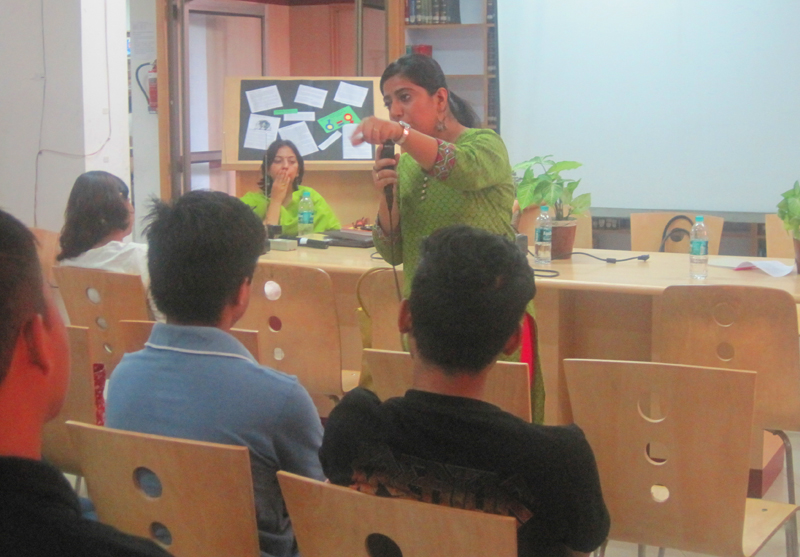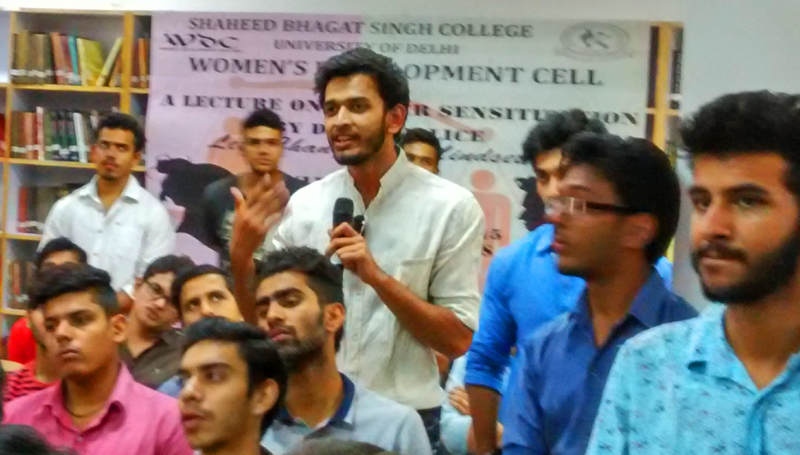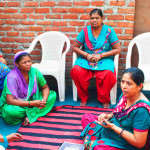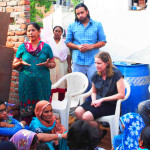Centre for Social Research (CSR) in collaboration with Nanakpura Police Station organized a Gender Sensitization Training Session at Shaheed Bhagat Singh College on 15th October, 2015. The training had over 150 boys from different departments as participants. The session was facilitated by Ms Pratishtha Arora, trainer with Gender Training Institute at CSR and Ms Smriti Sharma.


The training began with an introductory note from Dr Meera Mehta, Convenor of the Women Development Cell at Shaheed Bhagat Singh. Dr Mehta stressed that the need for such sessions lay in creating Gender Equality among students, so that both sexes can understand each other and co-exist together. Moreover, a student in introducing the organization mentioned a rather significant point, which was “Gender Sensitivity is said widely but understood rarely”.


The session began with the ‘Sex’ and ‘Gender’ debate. They were asked what they understood by both terms and did it imply the same. Amongst a rather diffident group of students, there was one who rightly differentiated between the two, elucidating that ‘Sex’ connoted the biological difference between men and women. On the other hand, the ‘Gender’ is what society gives us. With the discussion on ‘Gender Stereotyping’, they were asked whether they would play with dolls and where pink colored clothes? Their silence signified that they would not do so with the fear of being subjected to ridicule, followed by remarks such as “Kya ladki jaise bann ke aaya hai”. (Why have you come dressed like a girl). Therefore, this constant pressure to follow the stated societal norms perpetuates ‘gender stereotypes’. In between the discussion, there was an influx of questions and opinions that were put forth by a rather reluctant set of students who were of the view that Gender Sensitization Trainings should be conducted amongst women too. Why was it only so that men/boys were given such trainings? In response, Ms Pratishtha agreed that Gender Sensitization was equally important amongst women to raise consciousness regarding the issues affecting them and legal safeguards available at hand. To this, the students raised a few issues that were perhaps personal to them. A few that were the highlights of the discussion were.
Urban v/s Rural: A few exclaimed that such Gender Sensitization Programmes were not effective in urban areas as women here in various spheres have gained positions equivalent to or above men. The need for the same lay in rural and backward areas wherein women are still subjugated as an outcome of structures and ideology that enveloped our society. In response, firstly, they were illustrated that ideas are rooted in our social context; and once we move beyond these spaces our perceptions and notions tend to get shattered. Secondly, the emphasis on only rural areas requiring such Gender Sensitization Programmes negated the fact that Delhi is a composition of mixed cultures, often resulting in cultural conflicts. Thus, urban areas are equally prone to incidents of abuse against women. Thirdly, one is not denying that in comparison to urban areas, rural areas showcased the prevalence of atrocities against women at a larger scale. Therefore, it is necessary for students like them to become agents of change; utilizing their power of knowledge to create awareness around gender based violence.
Misled one way affair: A student illustrated that it is invariably assumed that the perpetrator of violence is always the man, and on being accused he always has to prove his innocence. Hence, at times the laws and provision oriented towards women are misused by them.
Interlocking structures of Gender-Caste: A discussion on the category of ‘Gender’ inevitably lead to a debate around the institution of education, with a special focus on caste. Several students were of the view that since our educational system followed a reservation policy, there were instances wherein women had dual benefits. Apart from caste based reservation in higher educational institutions there are a certain number of seats that are reserved for girls too wherein a girl having caste quota has double benefits. Therefore, there were boys who resisted separate quota for girls, insisting that in the fight for gender equality it is necessary that we follow a merit based system.
Along with the discussion on an ‘ideal type’ of a man and a woman, the concept of ‘patriarchy’ and ‘power’ was taken up. The students understood patriarchy as a structure wherein the father is seen as the head of the household, possessing the decision making powers. The position attributed to the father is an outcome of him being seen as physically strong, unemotional and competitive. Therefore, patriarchy and power are ideologically seen in continuum. Ms Pratishtha questioned such notions and defined power as the ability of any individual to utilize the same and put it to best use. As students too we possess the power to change the nation; bring about an attitudinal change wherein we can restructure existing gender relations.
The training ended with a nuanced approach towards the idea of Gender Sensitization with the suggestion that we should include the LGBT community and notions of homosexuality if the issue at hand was ‘gender’. Moreover, they stressed that we need solutions to the aforementioned problems, asserting the importance of “education”. It concluded with the hope that students see themselves as ‘agents’, possessing immense potential for bringing a change in themselves and society.
Donation for Centre for Social Research to Join our effort in rehabilitating Domestic Violence
Discuss this article on Facebook




